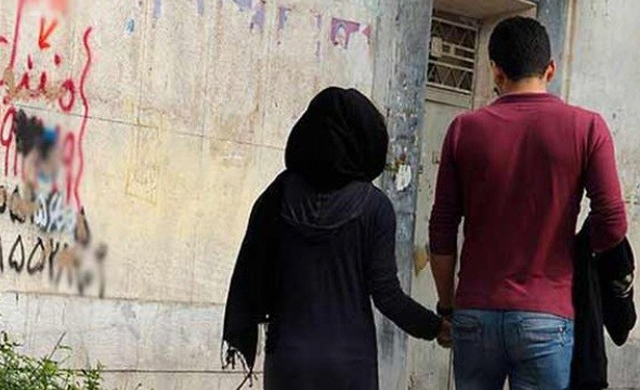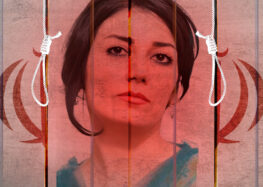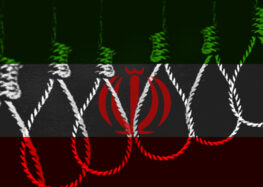Officials Seek to Confront Iran’s Increasingly Popular “White Marriages”

The increasing popularity of Iranian couples living together without getting officially married has alarmed officials of the Islamic Republic who question the morality of the practice and its impact on population growth demanded by Supreme Leader Ayatollah Ali Khamenei.
Couples in “white marriages,” as they are known, tend not to have children, and now the government wants to step in to address what it sees as a threat to the Iranian family.
In the latest reaction, a senior official said the government had created a special task force to study the growing phenomenon. “As white marriages increase, the country will not actualize the goal for a higher birth rate. It will have a negative impact,” Deputy Health Minister Mohammad Eslami said on May 24, 2016, as reported by the semi-official Iranian Labor News Agency (ILNA).
But in interviews with the International Campaign for Human Rights in Iran, several young couples said it was more important to freely choose their lifestyle than worry about the country’s birth rate.
ART STUDENT: OFFICIALS HAVE NO IDEA ABOUT OUR LIFESTYLE
One of the first official reactions to white marriages emerged in September of 2014. Siavash Sharivar, the director general in charge of social and cultural affairs in Tehran governor general’s office, denied that such unions were as common as the media claimed but at the same time announced that a plan to “promote traditional family values and confront white marriages” was in the final stages of development.
In recent years, there have been numerous reports in Iran’s media about the growing number of young couples choosing to live together without the legal confines of an official marriage. They prefer to keep the marriage status page blank in their national identification certificate (shenasnameh), hence the term “white marriage.”
“As far as I know and have witnessed, these kinds of unions take place mostly in Tehran,” Shiva, a 30-year-old resident of the capital told the International Campaign for Human Rights in Iran. “I myself moved to Tehran for my studies. I got a joint apartment with my boyfriend. But if I was living in my hometown, this kind of arrangement would not have been possible.”
Shiva continued: “The officials have no grasp of our lives or aspirations. Even our parents don’t understand our lifestyle. They think living with someone outside of marriage is indecent and shameful. If they knew I was living with my boyfriend, they would say I have lost my way. But the fact is that [my partner and I] have an active and simple life. We help each other but don’t want to get married.”
35-YEAR-OLD MAN: LIVING IN SECRET IS AGONIZING
Iranian law does not recognize relationships outside of registered marriages, and considers them to be “illegitimate” criminal acts. A prosecutor can summon unmarried couples to court and they can be punished based on Article 637 of Iran’s Islamic Criminal Code.
Mehrdad, a 35-year-old Tehran resident, said his generation is willing to take that risk.
“The present generation chooses how it wants to live and it isn’t very interested in marriage,” Mehrdad told the Campaign. “White marriages are very stressful but in recent years they have increased a lot. I and many of my friends are living this way and don’t see any problem with it. But my girlfriend and I always have to be careful to keep it a secret from her family. This part is agonizing.”
Mehrdad said his family was aware of the arrangement but it would be very difficult for his girlfriend’s family to understand. “Unfortunately these matters are many times more difficult for Iranian girls. Their families generally won’t accept it.”
He added: “My girlfriend is not from Tehran. She has told her family that she is living with a roommate but hasn’t told them that [the roommate] is from the opposite sex and her partner. The funny thing is that they would not have a problem if their daughter was living with a man as an unmarried couple outside Iran. But in Iran they seem to fear what people might say. They want us to also be afraid of how the people or the government might react.”
WOMEN’S RIGHTS ACTIVIST ASIEH AMINI: THEY ARE REDUCING WOMEN TO REPRODUCTIVE FACTORIES
One of the main concerns about white marriages is that they tend to be childless. That is unacceptable to a state bent on increasing the country’s population.
“In white marriages, young couples refrain from having children. Meanwhile their reproductive years go to waste and then later in life when they decide to get married, they face problems associated with pregnancy at an older age and sometimes it becomes too late to have kids,” Deputy Health Minister Mohammad Eslami said, as reported by ILNA on May 24, 2016.
In an interview with the Campaign, women’s rights activist Asieh Amini said comments like that point to an image of women as mere instruments for reproduction.
“When they see lower birth rates as something that is damaging to society and blame it on women who choose to live in white marriages, in essence they are again defining women only in their reproductive role,” Amini said. “The fact is that the government sees white marriages as a threat to its policy to promote and encourage legal marriages and increase birth rates. It cannot tolerate the fact that a social phenomenon has gotten out of its hands and is not surrendering to its control.”
“WORDS AIMED AT THREATENING CITIZENS”
In May 2014, Supreme Leader Khamenei issued a 14-point General Population Policy decree calling on the government to take measures to ensure a higher birth rate. “On the issue of population, we should take care not to make the mistakes which were made in recent years because the best situation for the enemy is a sparsely populated Iran with the elderly forming the majority of the population,” he said on May 25, 2014.
To achieve this goal, Deputy Health Minister Eslami has offered to provide counseling to unmarried couples to convince them to form a traditional family. But Amini says such “counseling” poses real dangers to unmarried couples.
“When a deputy minister offers counseling about this, he is asking unmarried couples to come forward. But if they admit to their illegal union, won’t they face punishment under Islamic law for having an illegitimate relationship?” Amini continued: “Based on Iran’s Islamic law if a person admits to having three [sexual] relationships outside of marriage, he/she can be condemned to death and executed.”
Amini, who lives in Norway, said many countries fully recognize unmarried unions and offer them full protection of the law.
“In Scandinavia where I live, the social and economic rights of women and men are recognized under the law even when they are living together outside of marriage. Even their children will enjoy all rights, including in matters concerning education and inheritance. This is very different from Iran’s marriage laws which are particularly harmful to women who are punished for choosing a lifestyle different from what the state wants,” Amini said.
WHITE MARRIAGE: A RELATIONSHIP BASED ON MUTUAL MATURITY
Shiva told the Campaign that in her experience, white marriage is “a relationship based on mutual maturity.”
“If both sides prefer to live this way and know what they are doing, I think there’s nothing wrong with it. As long as they don’t have children and respect each other’s rights as two adults without the need to register as a married couple, what’s wrong with that?”
Mehrdad, on the other hand, said he was aware of the negative consequences, especially for women in white marriages, who have no legal protections if the relationship goes sour.
He explained: “Recently one of my female friends broke up with the partner she was living with and she was forced to leave their joint apartment. She had to leave without taking anything from the life she had built for several years. She was literally homeless for a long time all because her partner had come to realize that his love for her was over and she had to leave.”
“These are personal things that are different in every case and I myself would never treat a woman like that. But these problems exist [in white marriage] and people and families are not yet ready to embrace it. They see it as promiscuous and degrading. Society in general and the state in particular is not ready for this type of lifestyle and as a result women suffer most.”
THE YOUNG GENERATION AND POPULATION POLICY CONCERNS
Two years ago Siavash Sharivar, the director general in charge of social and cultural affairs in Tehran governor general’s office, described white marriages as a “minor issue” involving just a “limited number” of couples. But he added: “Despite these limited numbers, we have to deal with this issue with cultural programs and social activism.”
Supreme Leader Khamenei’s insistence on population growth comes as recent statistics indicate a trend in the opposite direction. Alef reported on June 8, 2015, that according to the Health Ministry’s population and family health department, in June 2015 there were more than 11 million males and females of marriage age in Iran who were still single.






